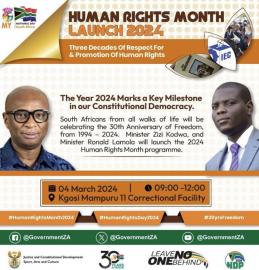
The year 2024 coincides with several historic milestones in the nation’s fight for fundamental human rights and freedoms, says Minister of Sport, Arts and Culture Zizi Kodwa.
“South Africans from all walks of life will be participating in the seventh National Elections since the dawn of democracy and the country, in April, will be celebrating 30 years of democracy in South Africa,” the Minister said on Monday in Pretoria.
He was addressing the launch of Human Rights Month, which is taking place under the theme: “Three Decades of Respect For and Promotion of Human Rights.”
Human Rights Month is observed to remind South Africans about the sacrifices that accompanied the struggle for the attainment of democracy.
“Overall, Human Rights Month serves as a reminder of the ongoing work needed to uphold and protect human rights for all individuals worldwide. It encourages reflection, action, and solidarity in the pursuit of a more just and equitable world.
“From 1994 to date, South Africa underwent a radical transition from the oppressive apartheid regime, with its system founded on parliamentary sovereignty, to a constitutional democracy committed to the creation of a society based on democratic values, social justice and fundamental human rights,” the Minister said.
Outlining the programme for Human Rights Month, he said the commemoration of the National Human Rights Day is planned for 21 March 2024 at the George Thabe Stadium, in Sharpeville.
“The hosting of the event in Sharpeville symbolises government’s commitment to honour sacrifices made by those who fought and died for our liberation in Sharpeville and other townships across the land. It makes sense that we take the commemoration of the day to the place where it originated.
“On 21 March, the national Human Rights Day is commemorated to honour the Sharpeville massacre of 1960 where peaceful protestors marched against discriminatory pass laws and were fatally shot by police. The Sharpeville massacre stands as a potent symbol of the brutal realities of apartheid.
“Sharpeville's historical significance extended beyond its national borders, receiving global attention, which culminated in the United Nations (UN) Security Council passing a resolution condemning the killings and calling for the South African government to abandon its policy of apartheid and the UN General Assembly declaring apartheid as a violation of the UN Charter,” the Minister said.
Six years after the massacre, the UN declared March 21 to be the International Day for the Elimination of Racial Discrimination.
“The Sharpeville massacre galvanised the anti-apartheid movement both within South Africa and internationally. It energized resistance efforts and led to increased solidarity among activists and organizations working towards the dismantling of apartheid.
“The massacre served as a catalyst for global awareness of the oppressive nature of apartheid and prompted increased international pressure on the South African government. Over the following decades, the anti-apartheid movement gained momentum, ultimately contributing to the dismantling of apartheid in the early 1990s.”
Activities
The Minister called on all South Africans to participate in the activities planned for Human Rights Month.
“This year’s National Human Rights Day will be preceded by an International National Human Rights Conference, bringing together key stakeholders from across the globe as well as other government departments, to assess progress on the advancement of human rights since 1994.
“The Conference will be hosted by the Department of Justice and Constitutional Development from the 18th to 20th of March 2024 and is premised on the department’s core mandate to uphold and administer the Constitution, deepening constitutional democracy, and promoting the values of human dignity, equality and the advancement of human rights and freedoms,” the Minister said.
Through this Conference, South Africa will conduct critical assessment of its state of human rights almost three decades into its constitutional democracy.
“There will be other activations across the country, amongst others, the Social Cohesion Dialogue to be hosted by the Eastern Cape province in Gqeberha on the 20th of March.
“Panellists in this programme include leaders who have demonstrated a commitment to building bridges across diverse communities. Amongst them will be Dr Brigalia Bam, former Chairperson of IEC and Dr Bonisile John Kani and Ms Rochelle de Kock from [the] Herald Newspaper,” the Minister said. –SAnews.gov.za


